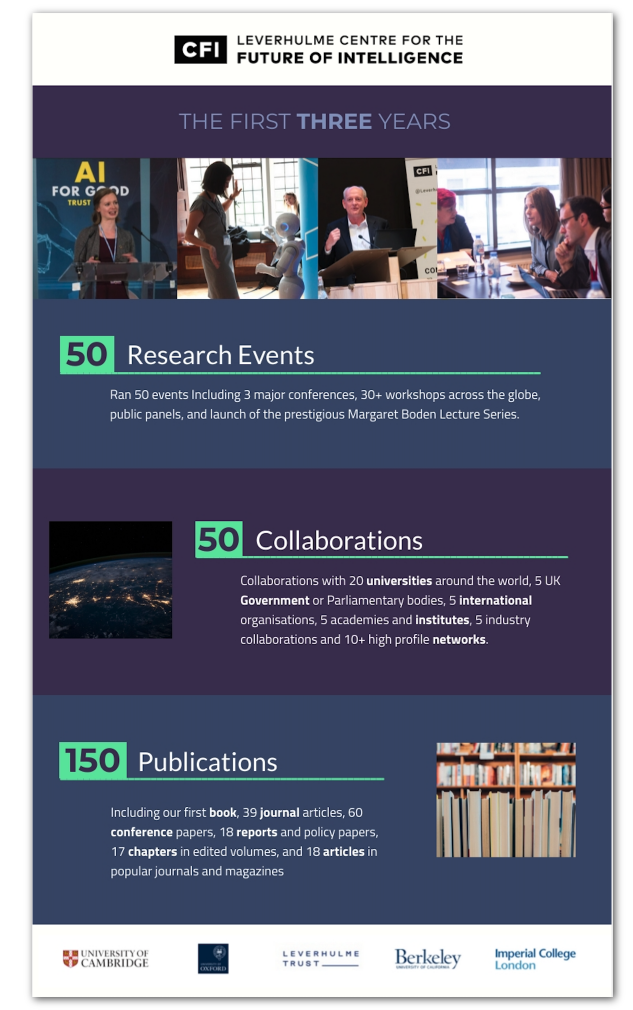In March 2020, Leverhulme CFI celebrated the end of its first three year research phase. Below is a summary of achievements to date, highlighting contributions to research, policy, and the future of AI.
50 Research Events
From global conferences to AI Olympics
Part of CFI’s mission is to advance and shape the interdisciplinary study of the ethics and impact of AI. We believe organising events is a crucial part of that, and in the past three years, we organised or co-hosted 50 such events.
We held three major conferences in Cambridge: Our launch conference in 2017, which featured world-leading speakers, including the (then) Minister for Digital, Matt Hancock; The 'Varieties of Mind' Conference, held 2018, which brought together experts on artificial and animal cognition; and the 'Kinds of Intelligence' conference in 2019, which established an annual event and global research community.
We were also delighted to launch the prestigious annual Margaret Boden Lecture series in 2018, and the first lecture was given by the eponymous Margaret A. Boden OBE, on “The Future of Intelligence: What Matters?”. In the following year, we welcomed the most influential living philosopher, Professor Daniel Dennett on ‘Smart Machines and a Reverse Turing Test’.
Consolidating global expertise is essential to tackling complex AI issues, and we've organised 30+ specialised academic workshops, in topics ranging from ‘machine learning and the law’ to ‘creative intelligence’. Our committment to cross-cultural collaboration meant 10 workshops and symposia were co-organised outside Europe and the US, and these ranged in topics from beneficial AI in Tokyo, to Arabic AI visions in Cairo, and Russian AI perspectives in St Petersburgh.
However, our events were, by no means, limited to the traditional. In 2019, our Kinds of Intelligence team created the first AI-animal competition, the AI-Animal Olympics, in which the performance of machines in problem-solving tests was pitted against the ingenuity of creatures great and small, from dogs to parrots and monkeys. The popular event was sponsored by Amazon and Good AI among others.
50 Collaborations
Working with Research, government and industry
Global collaboration is central to our ethos and we, currently, share researchers with the University of Bonn, have a partnership with the Australian National University, and have co-convened events with universities in six continents.
Our collaboration also extends into government and regulatory bodies. Our researchers have advised the OECD and World Economic Forum, and sit on government advisory boards, including the boards of the All Party Parliamentary Group on AI, the Government’s Centre for Data Ethics and Innovation, and the UN’s ‘AI for Good’.
We believe strongly that industry engagement is critical for making change, and have forged collaborations with PwC, Accenture, DeepMind/Google, GoodAI, the Partnership on AI, CogX, and the Ethics and Governance of AI Fund, among others.
150 Publications
From scholarship to policy
Dissemination is core to research, and since 2017, our team have produced over 150 publications. These include our first book: AI Narratives: A History of Imaginative Thinking About Intelligent Machines, published by Oxford University Press this year.
Our researchers have also published 39 academic articles in a range of disciplines, from philosophy to computer science, including six in Nature Machine Intelligence. We've published 60 conference papers (at venues such as ICML, NeurIPS, and AI Ethics and Society), 17 chapters in edited volumes, and 18 articles in popular journals and magazines.
Our commitment to informing policy and public discourse lead to the release of 18 reports and policy papers, including the influential Ethical and Societal Implications of Algorithms, Data, and Artificial Intelligence: A Roadmap for Research commissioned by the Nuffield Foundation, and Portrayals and Perceptions of AI and why they matter with the Royal Society.
. . .
We are proud of the hard work and acheivements of our team during these formative years. We now look ahead to a new chapter, and one that has already presented significant challenges at the intersection of AI and a global pandemic. The study of AI impact, development, and governance has never been more important, and we will continue to dedicate toward building a future of intelligence that is of benefit to all.
